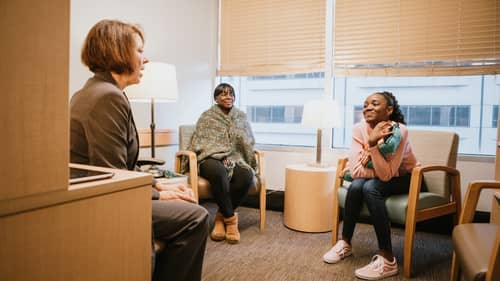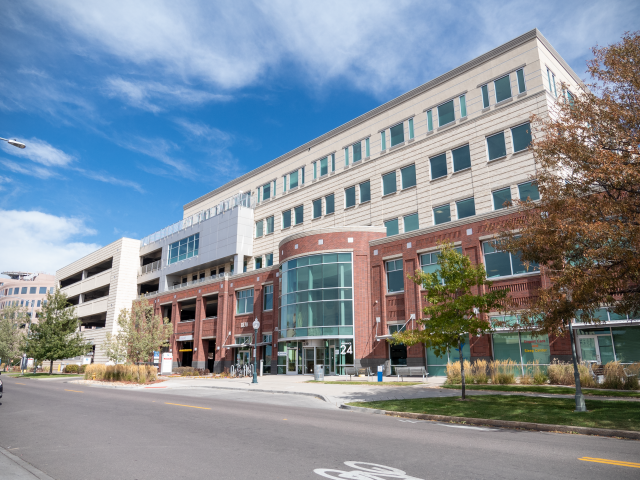Supporting Your Family Every Step of the Way
Do you have questions about ERC’s treatment, and what it might be like for your loved one? Join “What’s Treatment Really Like” (our monthly, live Q&A event) for an overview of our treatment programs and the opportunity to ask your questions.
"The care that ERC Pathlight showed toward our family was really incredible. We now have more skills and confidence. We could not be more grateful to our care team."
-

What to Expect in Treatment
-

Who We Guide Through Recovery
-

What Treatment Looks Like
-

Maintaining Academics While in Treatment
-

Locations for Child & Adolescent Treatment
-

Resources for Families and Friends
What to Expect in Treatment for Eating Disorders
Our eating disorder program for kids and teens provides a supportive environment with the necessary resources to nurture your loved one’s health, and to establish or strengthen their recovery.
We offer the right care at the right time, guided by a compassionate, specialized care team with an individualized treatment plan created to fit your loved one’s unique needs. At every level of care, we incorporate evidence-based treatment.
When a child or teen is faced with an eating disorder, their whole family is impacted. Having resources available for the entire support system can make all the difference. At ERC, we value empowering friends, families and caregivers through continued involvement, education and support.

Who We Guide Through Recovery
At ERC, we specialize in addressing eating disorders and co-occurring disorders like mood, anxiety, and trauma-related conditions for children and teens ages 8-17.* Through our continuum of care model (step-up or step-down options), we’re able to offer your loved one the right care at the right time.
*Programming for age 10 and under varies by treatment program and location.
Conditions We Treat
-

Eating Disorders
An eating disorder is a treatable mental illness that includes a number of different symptoms, including extreme emotions, attitudes, and behaviors surrounding weight and food issues. -

Anorexia
Anorexia is characterized by an overwhelming fear of gaining weight and restriction of energy intake that interferes with maintaining physical health.
-

ARFID
Avoidant/restrictive food intake disorder (ARFID) is characterized by avoidance of food due to sensory characteristics, fear of adverse reactions, or a lack of interest in eating that leads to persistent failure to meet nutritional needs.
-

Bulimia
Bulimia is characterized by patterns of bingeing (eating a large amount of food in a short period of time) and purging (eliminating calories consumed).
-

Diabulimia
The term “diabulimia” describes the symptoms of an individual with type 1 diabetes who intentionally misuses insulin for weight control.
-

OSFED
Other specified feeding and eating disorder (OSFED) refers to a variety of disordered eating behaviors that don’t meet all the diagnostic criteria for any other specific eating disorder.
Finding the Right Level of Support
Our full continuum of care begins with an initial assessment and continues through various stages of recovery and levels of support until your loved one is ready to fully transition out of our treatment.
Our programs are designed for children and adolescents to:
- Come as they are
- Get the right support at the right time
- Stay connected with our recovery community
As kids and teens progress through the various stages of eating disorder recovery, gradually stepping down to a lower level of care with increased opportunities for independence and autonomy helps your loved one maintain their recovery as they slowly become more involved with life outside of treatment. This process gives them a chance to test their skills while still maintaining structured connection to a supportive, recovery-focused environment.
“Being able to tell your story once and then live out the rest of your journey with the same care team and approach allows you to experience the full season of what you need.”
-

Inpatient
Our Inpatient programming is designed to support adults, children and adolescents of all genders who are acutely ill and are experiencing medical and mood instability as a result of their eating disorder.
-

Residential
Within ERC Pathlight's step-down model of care, the Residential eating disorder treatment program as well as the Residential mood & anxiety treatment program offer medically stable patients a highly-structured and supportive 24-hour treatment environment.
-

Partial Hospitalization
Our Partial Hospitalization Program (PHP) offers the intensity and structure of Residential eating disorders treatment while providing opportunities for our younger patients and their families to practice recovery skills outside of the treatment environment — during evenings at home or in recovery-focused housing near the eating disorder eating treatment center.
-

On-Site Intensive Outpatient Treatment
Our Intensive Outpatient program is a flexible eating disorder treatment program that allows patients to go to school during the day and sleep at home at night.
-

Virtual Intensive Outpatient - Eating Recovery At Home
ERC is removing the barriers that can keep patients with anorexia, bulimia, and other eating disorders from receiving treatment. Through telebehavioral health programming, Eating Recovery At Home (our virtual Intensive Outpatient Program) offers the same proven care as our in-person treatment centers.
What Treatment Looks Like
Your loved one may experience some mixed feelings about entering care. This is totally normal and usually lessens after an adjustment period.
Our main focus at the beginning of treatment is making sure your loved one is medically stable and mentally safe (in no danger to themselves). Not only is this step essential to their overall well-being but it’s also critical in helping them have the mental energy and clarity to fully engage in (and benefit from) individual/family sessions and groups.
After establishing stability, ERC will help your loved one address their symptoms as well as the underlying causes of the eating disorder. Our treatment includes goals like identifying and regulating emotions, learning coping skills and practicing them, and building confidence in your loved one’s ability to maintain recovery with the help of their support system.
Individual and family therapy, group sessions and nutrition support are all critical parts of child and adolescent eating disorder treatment, with each of these pieces typically happening every week. (depending on the level of care).

-
Individual Therapy
Throughout treatment, children and teens have individual sessions with their primary therapist on a regular basis. These opportunities provide genuine individualized guidance and support to challenge the eating disorder at its deepest layer. The primary therapist may also be involved in your loved one’s group sessions or meal settings, providing additional connection and support throughout care.
-
Group SessionsGroup therapy and education offers children and adolescents insight, validation and support from peers who can relate and have experienced similar challenges. Groups provide your loved one opportunities to develop new perspectives and understandings, while learning strategies and skills for resilient recovery.
-
Nutritional Stabilization and Recovery
An important aspect of child and adolescent eating disorder treatment includes the interruption of eating disorder behaviors, normalizing of eating patterns, and (if needed) weight restoration. All of these components are the focus of our nutritional rehabilitation process. Education surrounding nutrition, meal planning, and challenging any existing internalized weight bias or stigma are all goals of our treatment program.
-
Family Therapy and Caregiver Education
Family and caregiver involvement is especially critical for children and teens experiencing eating disorders. Our treatment approach for patients ages 8-17 is rooted in empowering parents or caregivers to act as supportive change makers in the recovery of their loved one. We do this through regular family therapy and/or family education on a weekly basis.
Our goal for families and caregivers is to help equip them to provide their loved one with understanding, compassion and nonjudgmental support. Family therapy focuses on skill building and education, and incorporates validation of the caregiver’s experiences and problem solving for their most difficult challenges. This process helps family members learn advanced caregiver skills, allowing them to support their loved one with confidence and the most effective support strategies.
We recognize that families will be prominent supporters of recovery when their loved one leaves our treatment, particularly when the child or teen is too young or developmentally compromised by the eating disorder to assume responsibility themselves. At ERC, we have developed an integrated program designed to help families and caregivers successfully support the recovery process during and after treatment.
Throughout the progression of treatment, your child will spend less time in a clinical setting and more time with you in “real life” situations before fully discontinuing care at ERC. Family meals, outings and passes are incorporated into treatment as your child moves forward in recovery, providing you an opportunity to learn how to support them through the various stages of their recovery journey.
A Highly Specialized, Skilled and Compassionate Care Team
The treatment of eating disorders requires expertise and specialized knowledge to effectively and safely apply evidenced-based care.
Kids and teens in treatment at ERC are supported by a team of renowned experts who specialize in the treatment of child and adolescent eating disorders and their common co-occurring mental health conditions. Throughout treatment, our skilled professionals collaborate on all aspects of your child’s care. Your loved one’s multidisciplinary care team includes:
- Psychiatrist
- Physician
- Therapist
- Registered Dietitian
- Other supportive staff that help in the day-to-day include nurses, education specialists, care coordinators, national family advocates, alumni and community outreach liaisons and others who are dedicated to providing the very best eating disorder care and aftercare support.
Outpatient Provider and ERC Collaboration
Patients and their families may come to ERC having already established an outpatient treatment team or trusted outpatient provider. Our goal is to work in partnership with these important and key outpatient team players to help achieve the best possible chance for recovery. This process includes communication and collaboration throughout treatment, particularly and most importantly toward the beginning and end of care.
Evidence-Based Treatment Proven to Be Most Effective for Children and Teens
The ERC treatment team develops a customized, evidence-based treatment plan designed for your loved one’s unique needs. Treatment plans include the following models of care, all of which are known to be highly effective in the treatment of eating disorders:
- Family-based treatment (FBT). Helps the therapist and family work as effective co-collaborators – with caregivers being the experts on their loved ones, and the therapist being an expert on eating disorder treatment.
- Emotion-focused family therapy (EFFT). Equips caregivers (parents, guardians, etc.) to take an active and impactful role in supporting their loved one’s recovery.
- Acceptance and commitment therapy (ACT). Helps children and adolescents focus on creating a meaningful life in recovery through connection to their values (what matters most to them).
- Dialectical behavior therapy (DBT). Helps your loved one create a life they can manage more skillfully instead of living a life based on avoidance.
- Radically open DBT (RO-DBT). Promotes openness, flexibility and social connectedness through questioning our believes and behaviors in order to make meaningful changes.
- Cognitive behavioral therapy (CBT). Helps kids and teens identify and correct negative thoughts about themselves, others and the world to decrease eating disorder behaviors.
- Trauma-focused CBT (TF-CBT). Helps children and adolescents who have developed challenging thoughts, feelings and behaviors after experiencing trauma.
- Exposure and response prevention (ERP). Helps your loved one safely confront their fears and interrupt patterns of avoidance and anxiety.
Our individualized treatment plans are designed for sustained recovery. Learn more about ERC’s treatment modalities.

Our Nutrition Approach
In eating disorder treatment, the primary medicine and number one healer is nutrition. ERC’s approach includes establishing consistent meals and snacks that incorporate a variety of foods, and challenging internal and external diet culture messages.
Our nutrition approach includes:
- Working with your loved one on a regular basis to select the components of their meals (options for breakfast, lunch and dinner), allowing for autonomy and confidence building in food choices.
- Use of an exchange system with the goal of moving toward intuitive eating.
- Encouraging patients to focus on flexibility and recovery, rather than calories or numbers, and allowing our dietitian staff to ensure nutritional needs are met.
- Providing individual, family and group sessions with a registered dietitian to support and answer any questions or concerns.
What to Expect During Mealtimes
Depending on individual needs, we consider three meals and one to three snacks per day to be a typical meal plan. During mealtimes, children and teens chat with peers and participate in light table games – helping them establish new meaning and connections to mealtime. Our clinical staff join meals and snacks to provide structure and support when needed.
Food will initially be plated for your loved one based on the food choices that they have selected (in accordance with the dietitian’s recommendations). As children and teens progress in recovery, they will build up to incorporating buffet-style dining during mealtimes to practice portioning out their own meals. As treatment continues, they may also have opportunities for restaurant outings and cooking groups.
Dietary Requests and Accommodations
ERC takes food allergies seriously. Documentation of scientifically proven food allergy testing is requested to accommodate your loved one’s needs, and we may also recommend further food allergy testing during treatment. When your loved one first meets with their dietitian, the staff will assess any special dietary requests (vegetarian, gluten-free, etc.) on a case-by-case basis. We may make accommodations for religious dietary practices, such as providing kosher meals for Jewish individuals if requested.
Teaching Families About Nutrition, Meal Support and More
ERC provides families and caregivers the opportunity to learn in our beautiful teaching kitchen where we provide family and friends skills and an understanding of the fundamentals of nutrition, food portioning and food plating -- helping caregivers feel confident in providing meal support themselves. Throughout their time at ERC, families will learn:
- How to help their loved ones overcome a fear of food or eating
- The importance of balance, moderation and variety in nutrition
- How to provide support and structure during meals
- How to combat unhelpful dialogue regarding food (such as “good” versus “bad” foods)
Maintaining Academics While in Treatment
At ERC, patients and their families do not have to choose between staying in school or getting care for an eating disorder. We understand how important it is for your loved one to continue their education while in treatment in order for them to be successful in an academic setting after care.
Our eating disorder program prioritizes time for academics as part of treatment and provides expert staff committed to making school and treatment work together. Available at all of our child and adolescent programs, our dedicated education specialists:
- Support patients with their daily schoolwork – helping ensure a sense of normalcy – and support them as they transition back to school
- Serve as your child’s advocates: helping them understand there is a plan for continued education, and allowing them to feel comfortable putting recovery first
- Ensure any material that schools send is taught in an appropriate way: promote mental wellness by lessening the anxiety about missed assignments
- Coordinate with parents, teachers and guidance counselors to make sure each student can continue their educational journey
- Provide individual educational support as needed
In sync with the education specialists, the clinical treatment team works with patients to continue the nutritional rehabilitation and skill development needed to function well at school. Learn more about ERC's educational support.
Eating Recovery At Home – Virtual Care
With specialized programming for children and teens, Eating Recovery At Home has been the leading virtual intensive outpatient program (IOP) for eating disorders since 2016. As effective as in-person treatment, this online eating disorder therapy program for ages 12 and up fits seamlessly into your family’s everyday life.
Whether your loved one is stepping down from a higher level of care or needs more support than outpatient visits provide, your child or teen will fine-tune the skills and tools needed to make progress in recovery through this completely virtual three-day-per-week (three to four hours per day) program that includes:
- Individual and group therapy
- Nutritional and meal guidance
- Family therapy and education
Just like our in-person care, Eating Recovery At Home offers extensive support, education and resources to all family members and caregivers. Caregivers of children and adolescents are present for all meals, entering and tracking them into the helpful Recovery Record app. Parents and guardians can feel empowered with our family-based treatment-informed care, shown to be the most effective intervention to help young people recover from eating disorders.

Home Away From Home
Cultivating a safe and welcoming environment is an important aspect of recovery, especially for children and teens. At the inpatient (IP) and residential (RES) levels of care, patients live at our treatment center 24/7, and at the partial hospitalization program (PHP) level of care, patients attend an intensive day program – seven days a week – making our centers a primary space of connection during their recovery process. For all these reasons and more, it is essential that our treatment centers feel welcoming and helpful to the healing process. Our child and adolescent units are designed with youths in mind, including home-like furnishings, colors and artwork that support a feeling of peacefulness and belonging.

Living Arrangements and Travel Accommodations
Choosing where to seek treatment for your loved one’s eating disorder is a big decision. Many times, the best treatment options are not close enough to home for daily travel or regular day trips. Individuals and their families travel from across the U.S. and from around the world to receive the best possible treatment through ERC. We’re honored that families often travel so far to be with us. However, we also recognize how stressful and overwhelming it can be to make travel arrangements while also coordinating the other aspects of admitting to treatment.
Our child and adolescent patients can choose to live in ERC apartments (with the supervision of their parent/guardian), a Ronald McDonald House, an Airbnb with family or friends, or an extended-stay hotel. During the admissions process at ERC, we discuss options for living arrangements based on your location and offer suggestions tailored to your family's needs. To help make the beginning of treatment as smooth as possible, our admissions team is available to help coordinate and answer any questions related to:
- Transportation
- Accommodations, hotels and lodging options*
- Local resources
*All IOP patients live independently and do not have housing provided by ERC.

How to Start Treatment
An eating disorder is a serious and complex mental health condition that, if ignored or untreated, can result in long-term negative impacts to the physical and mental health of children and teens. If you’re unsure if your loved one has an eating disorder, what their diagnosis might be or what level of care they might need – that is OK. We’re here to listen, ask the right questions, gain understanding and provide the right recommendation for your loved one's needs.
Asking for help from expert professionals is the first step toward finding an accurate diagnosis, getting the right treatment and guiding your loved one to lasting recovery. Our compassionate admissions team is here to help you through the entire assessment and admissions process with exceptional care and support. This group of master’s-level clinicians all have specialized training in eating disorders and mental health conditions. No referral is ever needed for a free assessment or to start treatment.
You can take your first step today by scheduling a free assessment with a member of our admissions team, or by giving us a call at 877-825-8584 to learn more about ERC’s admissions process.
Resources for Family & Friends
ERC knows you can be a vital support person for your loved one’s recovery. And we know it typically takes time and practice to become confident in your abilities as a support person. Being a caregiver to a child or teen struggling with an eating disorder can be challenging. Without the right education and guidance, it can be hard to know what to say or do and how to best help. To support you, ERC offers an array of resources specifically for family, friends and other caregivers including:
For any questions regarding support and resources, reach out to the community outreach liaison team at [email protected].

Find Your Support Group
ERC provides no-cost, trained facilitator-led support groups for family members and friends who have a loved one battling an eating disorder. Connecting with other families and friends who can relate to your circumstances offers insight, time for reflection, and your own space for support. Groups are ongoing, with no obligation to commit to attend every week or for a specific number of weeks. Registration is required, but we promise it is quick and easy.
Hear Recovery Stories From Those Who Have Been Through Treatment
ERC has an incredible group of alumni and family members who have been selected to share their personal recovery stories with ERC patients, alumni, families and the broader community. Together, they are the Recovery Ambassador Council (RAC). Members of RAC passionately speak from the heart with the goal of inspiring hope for recovery. You can request to connect with our Recovery Ambassador Council members by emailing [email protected].
Attend Events
We are thrilled to offer an array of educational opportunities and events to our alumni, caregivers, families, community members and professionals.
What’s Treatment Really Like
Do you have questions about ERC’s treatment and what it might be like for your loved one? Join “What’s Treatment Really Like” (our monthly, live Q&A event) for an overview of our treatment programs and the opportunity to ask your questions.
Hope Orientation for Family & Friends
We know the process of trusting ERC and continuing to support your loved one through their first few steps toward treatment is no small task. This presentation covers next steps, practical tips for how to make the most of treatment and best ways to support your loved one during their early stages of recovery.
Virtual Family & Friends Education Series
This educational opportunity is designed specifically for families, friends, caregivers and support people learning to help someone heal from an eating disorder.
Eating Disorders 101
Led by a relatable and lived-experience presenter, this informational session is for any caregiver wanting to better understand their loved one’s eating disorder – starting with the basics.
Eating Recovery Center offers a robust array of resources including articles and blogs that cover tips for mealtime support, how to provide self-care as the parent of a child with an eating disorder, support guidelines for the entire family unit, and more.
Welcome
Emotion Basics
Step 1
Step 2
Anger
Silence/Shut Down
How to Pay for Treatment
When faced with a life-threatening eating disorder, you shouldn’t have to worry about how to pay for your loved one’s treatment; your top priority is finding the best care possible. Let us make things more manageable by allowing our experienced benefits team to work with your insurance company to ensure all of your financial resources are being used to your benefit. We can contact your insurance company on your behalf and provide you with a breakdown of your coverage in terms you can understand.
Child and adolescent eating disorder treatment at ERC is covered by most commercial insurance plans. Give us a call at 877-825-8584 to learn more.
Covered by Most Commercial Insurance Plans
Our patient access team is here to advocate for you. We can help you address financial challenges and work with you to get you the maximum coverage offered by your plan.
Frequently Asked Questions
-
Should family members stay nearby when a loved one is in eating disorder treatment?
While your loved one is in our care, we frequently suggest that family members and friends return home to care for themselves and other family members, and rest and restore. We also understand that every individual is different and personal circumstances often vary.
Please communicate with the ERC treatment team if you feel that you should stay near your loved one’s treatment center. We will work with you to help make the decision and arrangements that are best-suited for your family.
-
Where can I find eating disorder support for families and caregivers?
As a caregiver, you may feel incredibly overwhelmed and overloaded. Know that it is normal to feel this way, particularly as you take a big step into the unknown with your loved one.
You are not alone! Our entire team of Community Outreach Liaisons, National Family Outreach Manager, and National Family Advocate are all available to answer questions or lend a listening ear. Contact us at [email protected].
-
What is the typical length of eating disorder treatment?
You may wonder how long your loved one will be in our care. While the treatment journey is different for each person, key markers of recovery include Mental/Emotional Stability, Medical Stability, and Insurance Coverage.
-
What are the key markers of recovery?
All distressing and harmful behaviors – and any serious or acute mood disturbances – will need to be understood, addressed, and treated. Behaviors including starvation, purging, binging, excessive exercise, substance use, and self-harm have been used to help your loved one avoid difficult feelings and thoughts. Yet these behaviors that once served to help them cope ultimately become serious problems.
-
What can I expect in terms of insurance and payment?
Insurance companies will sometimes have different criteria and standards for how long your loved one can remain in treatment. While we work closely with third party payers, ultimately – if you are using insurance for treatment – they have the final say regarding length of stay.
More often than not, we are in full agreement with insurance providers regarding treatment plans and length of stay. If a situation arises and we are not aligned, our dedicated business office staff will help you advocate with insurance providers and answer any questions.
-
Will I be able to communicate with my loved one? Will I be able to contact their care team?
Yes, you can communicate with your loved one. Your loved one will have access to their electronics throughout the treatment day. Yes, you can communicate with the care team. C&A family members will be contacted by the care team the day of admission and will be included in all stages of treatment. Family members of adult patients are invited and encouraged to be a part of the treatment process. Adult patients must complete paperwork giving the care team consent to communicate with family members.
-
How frequently can I visit my loved one while in treatment? At what point is visitation allowed?
Family and friends are welcome to visit their loved ones in treatment. Please contact the care team to discuss what is supportive for the patient. The care team can provide details re: the specific visitation information.
-
Am I permitted to send mail and/or packages to my loved one?
Yes, mail and packages are welcomed. Please talk with the care team to learn more about the mailing address.
-
How will I know when we are nearing a discharge date?Planning for discharge will be discussed with you, the care team and the patient. It is important to plan for a seamless step down by completing IOP and scheduling outpatient appointments before discharging.
Additional Resources
- López,-G.F., García-Hermoso, A., Smith, L., et al. (2023). Global proportion of disordered eating in children and adolescents: A systematic review and meta-analysis . JAMA Pediatrics 177(4), 363–372. doi:10.1001/jamapediatrics.2022.5848.
- National Institute of Mental Health. (n.d.). Eating disorders. Retrieved November 7, 2023 from https://www.nimh.nih.gov/health/statistics/eating-disorders.
Hide Last Child Layout Div


























